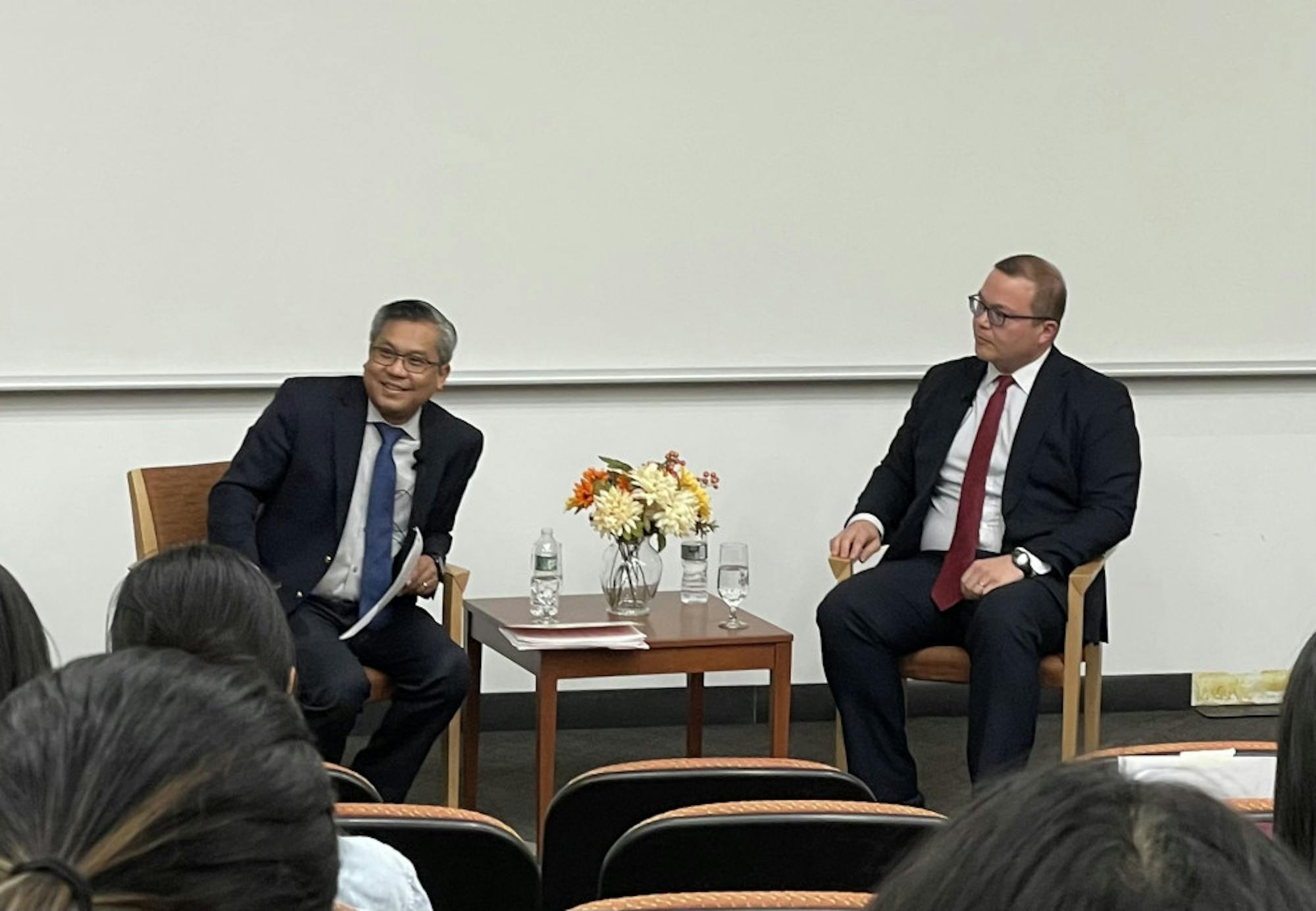Ambassador Kyaw Moe Tun, the permanent representative of Myanmar to the United Nations, spoke at Tufts on March 31 about Myanmar’s ongoing crisis. During the event, called the “International Responsibility in Responding to Myanmar’s Crisis,” Tun discussed his country’s recent military coup — and the ensuing international response — with David Muehlke, Fletcher’s state department fellow.
The event was organized by student leaders from the Fletcher ASEAN Society and by Tufts’ Myanmar Students Union. It was co-sponsored by the Center for South Asian and Indian Ocean Studies, the Fletcher Dean’s office.
Following the National League for Democracy’s victory in Myanmar in November 2020, the country’s military rejected the results of the election and staged a coup d’etât in February 2021, arresting the members of the elected civilian government and its leader, Aung San Suu Kyi.
Tun, who remains loyal to Myanmar’s elected government, was the country’s U.N. ambassador at the time of the coup. Since the U.N. has not acknowledged the military government as legitimate, Tun remains in his role at the U.N. He was recently shortlisted for a Nobel Peace Prize.
“What we see is very clear: that the coup itself is [a] gross violation of the rule of law and amounting to high treason,” Tun said at the opening of the event. “The people have rejected the military coup in every possible way. They never accepted the subversion of their democratic rights and freedoms.”
Tun said more than 3,000 people have been killed by the military junta and that the military has engaged in “indiscriminate aerial bombing” against its own citizens.
“These crimes are not mere human rights abuses: They are deliberate, systematic, widespread and coordinated attacks against the civilian population,” he said.
Tun ended his introduction by urging international institutions to hold the military junta accountable for their actions.
“There is a lack of decisive action from relevant established international mechanisms such as the U.N. [Security Council] and the [International Criminal Court] to save lives of innocent people,” Tun said. “People on the ground are dying. People on the ground are really suffering. … We want the international community to hear the voices of the people of Myanmar.”
Asked by Muehlke, the Fletcher state department fellow, what his experience is like working at the U.N., Tun said that he can get frustrated by inaction on the part of other members.
“The [U.N.] members hear the voices of the people loud and clear, but the action that we receive does not really … live up to the expectation of the people,” Tun said. “We have a resolution [in] the General Assembly, but the elements that are contained in the General Assembly Resolution [are] not that much [and] not legally binding.”
Muehlke also asked Tun if he expects any key events to happen in Myanmar within the next year. Tun pointed to potential action being taken by the U.N. Security Council and the upcoming Association of Southeast Asian Nations summit in May.
Muehlke then asked how Myanmar can have a democratic future, specifically pointing out the ethnic cleansing of Rohingya Muslims as a point of concern.
“We need to find a solution including the repatriation of the Rohingya in a voluntary, safe and dignified manner,” Tun said. “Our young generation, they are leading us. They are the ones who will build a country of the future.”
Tun then took questions from the audience. Asked about sanctions as an effective tool, Tun said that they are effective despite concerns about the impact on civilians.
“Some people say [sanctions] might affect only the general public,” Tun said. “Look at the crisis of the general public. We have nothing else to lose. … That is why we keep urging the international community to impose sanctions against the military.”
Another student asked Tun how the United States can convince China to stop supporting the military junta.
“The voices of the people of Myanmar are very clear,” Tun said. “Only a federal democracy will make the country be stable, so that is the message that we always convey to the countries in the region.”
Tun also discussed the prospect of the military junta holding sham elections and urged countries to put pressure on those who support the junta’s plans.
“The sham election, if they go through [with it], definitely [will] create more violence in Myanmar,” Tun said. “The Secretary of State, Mr. Blinken, already [talked] about rejecting any kind of election organized by the military. … It is very clear it will never be a free and fair and independent election.”






